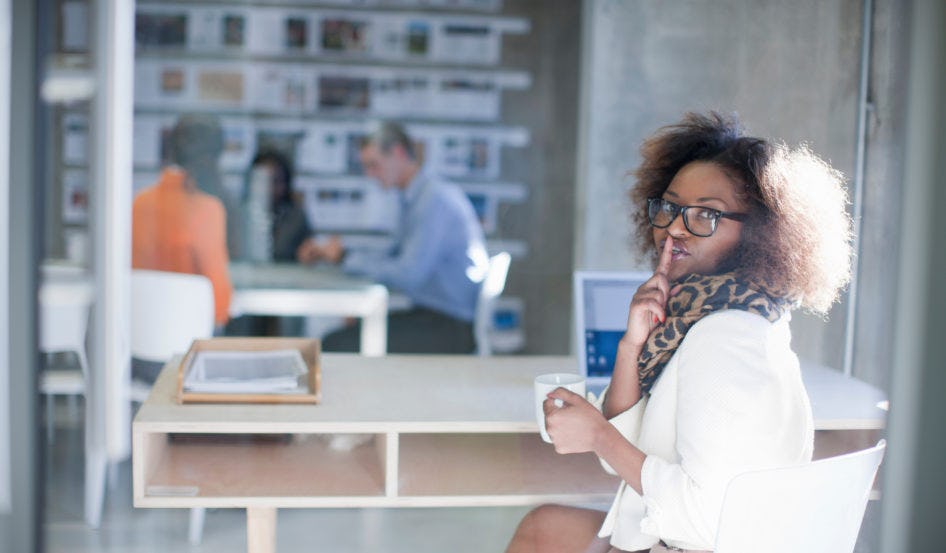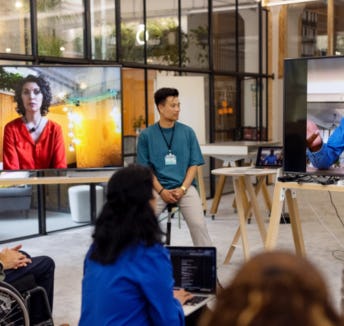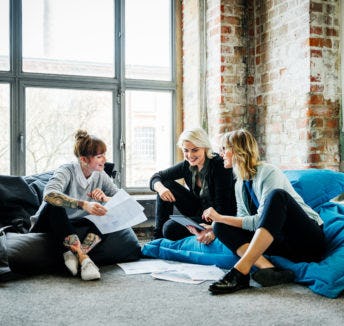
Lockdown has made us extra-sensitive to offices and the people we share them with. Whether it’s the noises they make or the brightness of the lights, the small details are becoming a big deal.
Hybrid working is about having choices. It is still the same people doing the same work, but they don’t have to unquestioningly turn up to the company HQ each day, or be part of the commuter throng, or sit at the same desk regardless of whether or not it works for them.
Before the pandemic and the various lockdowns that ensued, hybrid working was sometimes considered to be a bit of a luxury, negotiated by only the savviest of employees. But now it’s a normal, no, necessary part of working life for so many of us, expectations have increased.
Too much noise
According to a study by the RIBA journal, noise has become one of the key issues and irritations of modern office life. Four in 10 office workers said poor acoustics were impacting their concentration, and a quarter said they felt stress induced by noise. “Noise may seem like a minor irritant, but not addressing it could hurt your business’s bottom line and put your employees’ health at risk,” says Ben Hancock from Oscar Acoustics.
It can be a tricky balance. Much like the universal conversations about office air conditioning, there is no failsafe solution that works for everyone. Music or no music? Meetings at the desk or somewhere out of earshot? Sometimes it’s the big things like the general hubbub and acoustics of the building, and sometimes it’s the small things like the sound of the person next to you eating a packet of crisps.
That’s why at Spaces offices we have plenty of areas to escape to when you need, like the café-deli and kitchen areas, or cosy booths where people can have informal meetings or just feel a bit more hidden or enclosed. There are living room style areas and private offices if you want to relax away from other people for a while, or close a door and have a personal conversation. And there are big open spaces too, if you’re one of those people who thrives off a bit of background bustle. There are options – choices.
Hypersensitivity
Jeremy Myerson, emeritus professor at the Royal College of Art, and co-author of Unworking: The reinvention of the modern office, says that our months spent working alone during lockdown has changed our susceptivity to noise and other people. “When you’ve spent two years alone, you become very sensitive to noise,” he says. “What we’re hearing from HR departments is that people are hypersensitive to their environments.”
That’s not to say home is the perfect solution either – it can be full of distractions, from the relentless doorbell to young children, needy pets, and the strange allure of putting the washing on in the middle of the working day. “A lot of people need the office for focus work,” says Kristin Cerutti, senior designer at Nelson Worldwide.
The growth of the hybrid model has shown how having a variety of spaces available suits the workforce, accommodating different styles and needs. Big HQ offices aren’t always the most suitable venue for a particular day or meeting, and they are no longer being viewed as necessary for everyday presenteeism.
Coworking and flexspaces give companies and individuals the freedom to choose where and when they work, as well as that important sense of ownership over the daily or weekly routine. It also enables all sorts of employee preferences to be accommodated, from flexible hours to the distance from peoples’ home, and that variety of different spaces where you sit or stand to get the work done.
It’s about the fine details too. Acoustics, lighting (some people prefer softer, darker areas), and the amount of technology in the room is all part of office design now, because what some people thrive off, others find draining. The hybrid model is about finding a setup that works for everyone.
The extremes we faced as a community of workers during lockdown made people more aware of their individual needs, and more confident about asking for them. It also caused such a colossal shake up in terms of the established working practices that the future is still being moulded – and we think it should be as accommodating as possible.
Find out more about how we can help you to build a working culture that works – for everyone.
Share this article
 Read now How to nail your meetings in the hybrid world
Read now How to nail your meetings in the hybrid world
 Read now ‘Let’s catch up’ - why we have to make time for mental health conversations.
Read now ‘Let’s catch up’ - why we have to make time for mental health conversations.